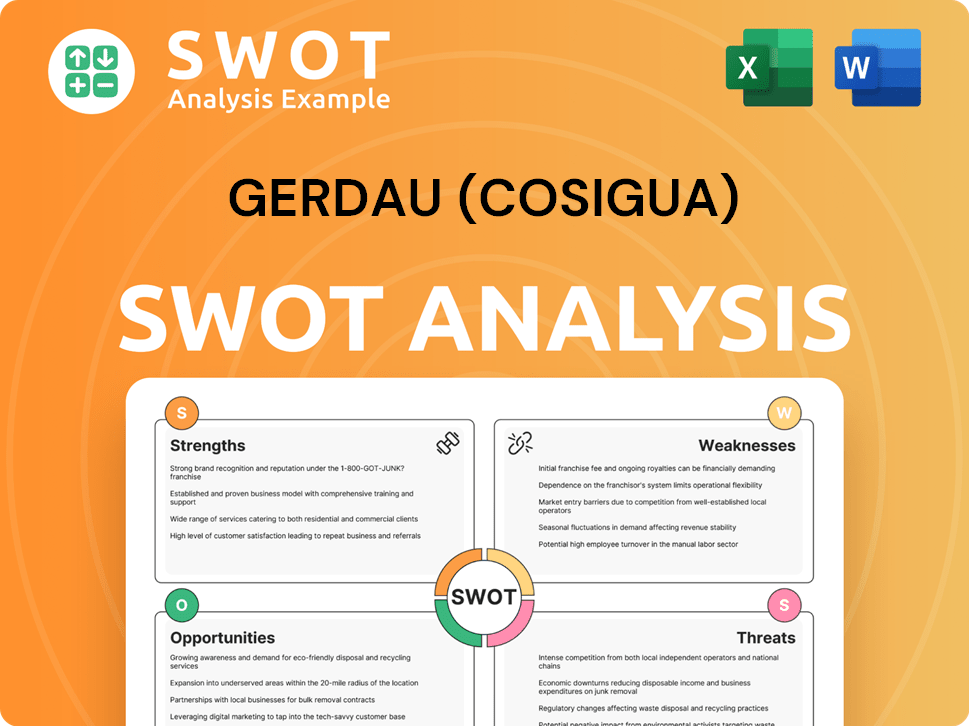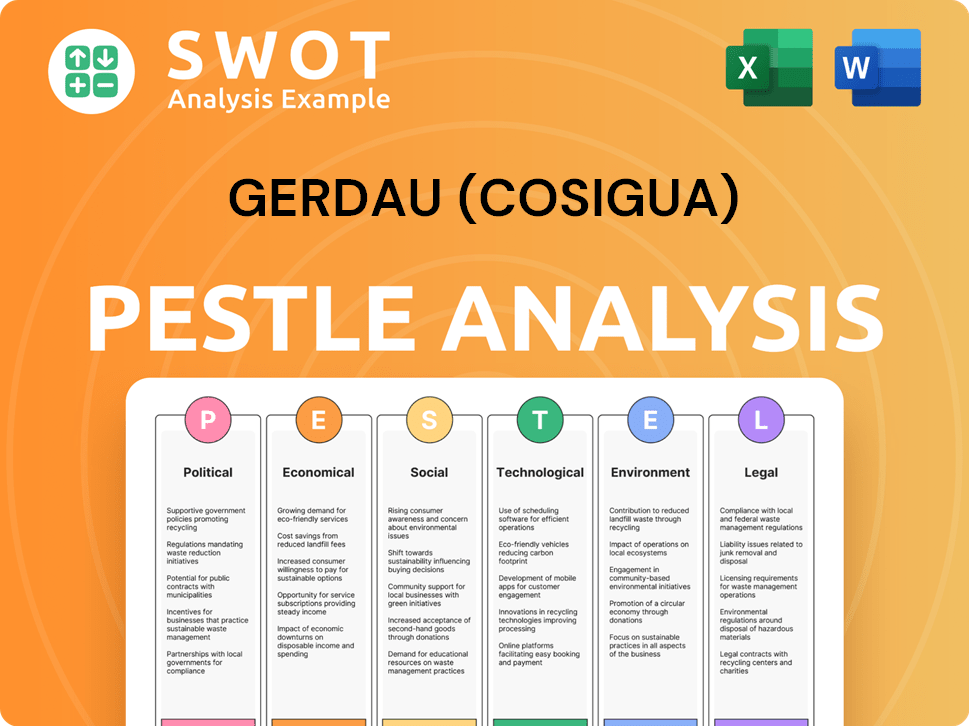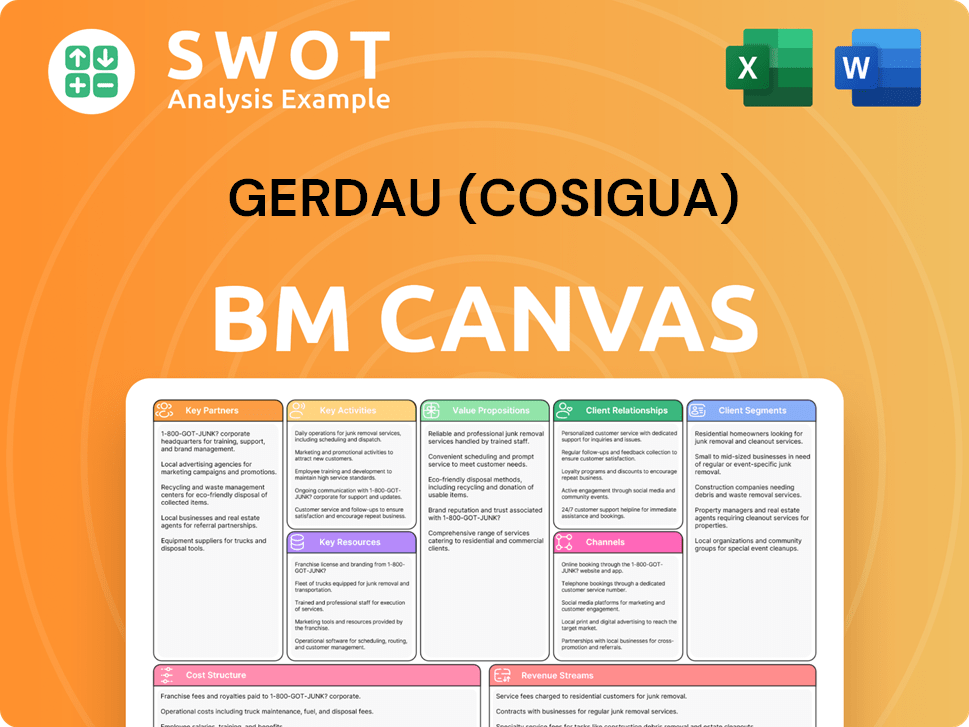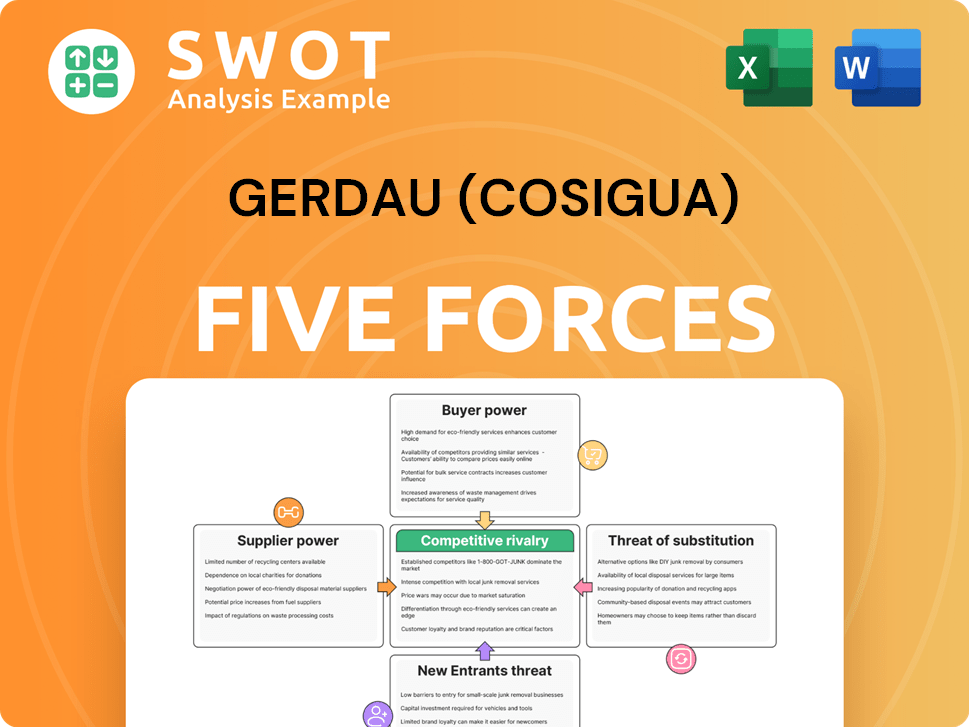Gerdau (Cosigua) Bundle
How Does Gerdau Cosigua Navigate the Steel Industry's Challenges?
Gerdau S.A., a global steel giant, constantly reshapes its strategies to thrive amidst fierce competition and evolving market dynamics. Recent financial results, like those from Q1 2025, highlight the importance of geographic diversification, with North American operations offsetting Brazilian market fluctuations. This analysis dives deep into Gerdau Cosigua's competitive landscape, offering essential insights for investors and industry watchers alike.

From its roots as a nail factory, Gerdau Cosigua has become a Latin American steel leader, a testament to its strategic prowess. Understanding the Gerdau (Cosigua) SWOT Analysis is crucial to grasping its strengths and weaknesses. This exploration will provide a detailed steel industry analysis, examining Gerdau Cosigua's market share, competitor analysis, and strategic initiatives within the Brazilian steel market and beyond, offering a comprehensive view of its competitive advantages.
Where Does Gerdau (Cosigua)’ Stand in the Current Market?
Gerdau Cosigua holds a significant market position within the global steel industry, especially as Brazil's largest steel producer. It is a leading supplier of long steel in the Americas and a major player in special steel worldwide. The company's core operations involve producing carbon and specialty steels used in construction, manufacturing, and agriculture.
The value proposition of Gerdau lies in its diverse product offerings, including semi-finished and long rolled products. These products cater to various sectors, ensuring a broad market reach. Gerdau's strategic investments in technology and expansion projects highlight its commitment to enhancing its competitiveness and operational reliability.
In Q1 2025, Gerdau's net sales reached R$17.4 billion, with physical steel shipments totaling 2.9 million tonnes. The company's adjusted EBITDA was R$2.4 billion, and adjusted net income was R$758 million. The net debt over EBITDA ratio was 0.69 times, indicating a strong financial position.
Gerdau's geographic presence is diversified across Brazil, South America, North America, and Europe and Asia. In 2018, the sales breakdown was Brazil (37.4%), South America (10.4%), North America (51%), and Europe and Asia (1.2%). The North American operations saw a 7.9% increase in shipment volumes in Q1 2025.
Gerdau invested R$1.4 billion in capital expenditures in Q1 2025, with 60% allocated to expansion projects and technological upgrades. A key project is the expansion of its hot-rolled coil mill at the Ouro Branco unit. This expansion will add 250,000 tonnes of annual capacity.
Gerdau's primary product lines include carbon and specialty steels used in construction, manufacturing, and agriculture. The company produces semi-finished products like billets and blooms, along with long rolled products such as rebars and wire rods. Drawn products like fence wire are also produced, primarily for the domestic market.
Gerdau's competitive advantages include its strong market position in Brazil and the Americas, diversified product offerings, and strategic investments in capacity expansion and technological upgrades. The company's focus on operational reliability and asset competitiveness further strengthens its position in the competitive landscape.
- Brazil's largest steel producer.
- Leading supplier of long steel in the Americas.
- Strong financial performance with a solid net debt over EBITDA ratio.
- Strategic investments in expansion projects.
Gerdau (Cosigua) SWOT Analysis
- Complete SWOT Breakdown
- Fully Customizable
- Editable in Excel & Word
- Professional Formatting
- Investor-Ready Format

Who Are the Main Competitors Challenging Gerdau (Cosigua)?
The Gerdau Cosigua operates within a highly competitive global steel market, facing a diverse range of competitors. A thorough competitive landscape analysis reveals both direct and indirect rivals that impact its market position and financial performance. Understanding these dynamics is crucial for assessing Gerdau Cosigua's strategic initiatives and investment analysis.
The steel industry analysis reveals that Gerdau competes on multiple fronts, including price, innovation, and market share. Fluctuations in global steel prices and regional trade policies significantly influence its operations. This environment necessitates ongoing adaptation and strategic responses to maintain and enhance its competitive advantages.
The competitive environment involves a complex interplay of factors, including raw material costs, production capacity, and sustainability practices. The company's ability to navigate these challenges determines its long-term success. For a deeper dive into Gerdau's overall strategy, consider reading about the Growth Strategy of Gerdau (Cosigua).
Direct competitors include major steel producers such as Tenaris (TS), POSCO (PKX), Ternium (TX), Companhia Siderúrgica Nacional (SID), Nucor Corp, Steel Dynamics Inc., and United States Steel (USS).
Indirect competitors include diversified industrial companies like Hindalco Industries (aluminum and copper) and Sandvik (engineering, manufacturing, mining, and infrastructure).
Market share is a key indicator of competitive performance. For example, the Brazilian market saw a surge in steel imports, with a 30% increase in Q1 2025, affecting domestic market share.
Financial performance varies among competitors. Tenaris, for instance, has higher earnings, but Gerdau may present a more affordable valuation based on its price-to-earnings ratio.
Changes in trade policies, such as the reintroduction of Section 232 Tariffs in the U.S., boost demand for locally produced steel, benefiting Gerdau's operations in North America.
Mergers and alliances continuously reshape the competitive landscape, as companies seek to gain scale, diversify product portfolios, or enhance market access.
Several factors influence the competitive dynamics within the Brazilian steel market and globally. These include:
- Price Competitiveness: Ability to offer competitive prices.
- Production Capacity: Scale of operations and efficiency.
- Innovation: Technological advancements and product development.
- Market Access: Distribution networks and geographic reach.
- Raw Material Costs: Impact of raw material prices on profitability.
- Trade Policies: Tariffs and import/export regulations.
Gerdau (Cosigua) PESTLE Analysis
- Covers All 6 PESTLE Categories
- No Research Needed – Save Hours of Work
- Built by Experts, Trusted by Consultants
- Instant Download, Ready to Use
- 100% Editable, Fully Customizable

What Gives Gerdau (Cosigua) a Competitive Edge Over Its Rivals?
Gerdau (Cosigua) maintains a strong competitive position within the Brazilian steel market, driven by its strategic initiatives and operational strengths. A key aspect of its success is its ability to navigate market volatility through geographic diversification and efficient capital allocation. For instance, in Q1 2025, Gerdau's performance in North America helped to offset challenges in Brazil, demonstrating the value of its diversified operations.
The company's focus on technological upgrades and sustainable practices further strengthens its competitive edge. Gerdau (Cosigua) is investing in advanced technologies to improve efficiency and reduce environmental impact. These investments are crucial in a market increasingly focused on sustainability and regulatory compliance, positioning Gerdau favorably for long-term growth.
Understanding the competitive landscape of the steel industry is crucial for investors and stakeholders. This analysis will delve into Gerdau's key advantages, including its diversified operations, technological advancements, and commitment to sustainability, providing a comprehensive overview of its market position and strategic direction. For a Brief History of Gerdau (Cosigua), you can learn more about the company's evolution and milestones.
Gerdau's extensive geographic presence across the Americas is a significant competitive advantage. This diversification allows the company to mitigate risks associated with regional market fluctuations. In Q1 2025, the strong performance in North America helped to offset challenges faced in the Brazilian market, highlighting the benefits of a diversified operational base.
Gerdau (Cosigua) operates the largest mini-mill in Latin America, which enhances its production capabilities. The company's focus on technological upgrades, such as the electrical and controls upgrade of its rolling mill #2, scheduled for completion in 2025, aims to improve efficiency and minimize metallic losses. These upgrades are designed to enhance production capacity and reduce operational costs.
Gerdau's commitment to sustainability and its circular economy model provides a distinct competitive advantage. As the largest recycler in Latin America, it transforms over 10 million tonnes of scrap annually. The company aims to further reduce carbon emissions to 0.82 tonnes of CO₂e per tonne of steel by 2031.
Gerdau's strong financial health provides a solid foundation for continued investment and resilience against market fluctuations. In Q1 2025, the net debt over EBITDA ratio was 0.69 times, demonstrating its financial stability. The consistent return of capital to shareholders through dividends and share buybacks also highlights strong financial management.
Gerdau (Cosigua) leverages several key advantages to maintain its competitive edge in the Brazilian steel market. These advantages include strategic geographic diversification, proprietary technologies, and a strong commitment to sustainability. These factors contribute to Gerdau's resilience and long-term growth potential.
- Geographic Diversification: Operations across the Americas mitigate regional market volatility.
- Technological Advancements: Investments in operational efficiencies, such as the electrical and controls upgrade of its rolling mill #2.
- Sustainability: Largest recycler in Latin America, reducing carbon footprint.
- Financial Stability: Strong financial health, with a net debt over EBITDA ratio of 0.69 times in Q1 2025.
Gerdau (Cosigua) Business Model Canvas
- Complete 9-Block Business Model Canvas
- Effortlessly Communicate Your Business Strategy
- Investor-Ready BMC Format
- 100% Editable and Customizable
- Clear and Structured Layout

What Industry Trends Are Reshaping Gerdau (Cosigua)’s Competitive Landscape?
The competitive landscape for Gerdau Cosigua is shaped by dynamic industry trends, regulatory changes, and global economic factors. A comprehensive steel industry analysis reveals that the company faces both opportunities and challenges. Understanding the market position and adapting to these influences is crucial for Gerdau's strategic initiatives and sustained success.
Examining the Brazilian steel market and the competitive environment, it's clear that Gerdau must navigate import pressures and macroeconomic uncertainties. The company's financial performance and market share are influenced by its ability to leverage its competitive advantages and respond to evolving industry dynamics. This analysis provides insights into Gerdau's position relative to its competitors, including its strategic initiatives and future outlook.
Technological advancements are transforming steel production, with Gerdau investing in upgrades, such as artificial vision cameras for optimized cutting. Regulatory changes, particularly regarding environmental standards in Brazil, also impact the competitive landscape. U.S. trade policies, including tariffs, offer opportunities for North American operations.
The Brazilian market faces pressure from excessive steel imports, which surged by 30% in Q1 2025. Rising inflation and high interest rates in Brazil pose potential demand risks. Uncertainties remain regarding the impact of U.S. tariffs, particularly on Canadian products.
Gerdau is investing R$6.0 billion in CapEx for 2025, focusing on competitiveness and maintenance, including expanding hot-rolled coil capacity, expected to yield an EBITDA gain of nearly R$400 million. Demand for steel linked to infrastructure investments, especially in the U.S., is positive.
Gerdau's geographic diversification and focus on cost control are key strategies for adapting to volatile macroeconomic scenarios. The company's commitment to responsible mining, as recognized by the IRMA Standard, enhances its position in a sustainability-conscious market. For more insights into Gerdau's strategic direction, see the Growth Strategy of Gerdau (Cosigua).
Gerdau Cosigua's competitive landscape is influenced by technology, regulations, and economic factors. The company faces challenges from imports and economic volatility but also benefits from strategic investments and infrastructure demand.
- Technological upgrades and responsible practices are crucial.
- Geographic diversification and cost control are key for resilience.
- Investment in higher-value products and operational reliability are priorities.
- The company must navigate import pressures and economic uncertainties.
Gerdau (Cosigua) Porter's Five Forces Analysis
- Covers All 5 Competitive Forces in Detail
- Structured for Consultants, Students, and Founders
- 100% Editable in Microsoft Word & Excel
- Instant Digital Download – Use Immediately
- Compatible with Mac & PC – Fully Unlocked

Related Blogs
- What are Mission Vision & Core Values of Gerdau (Cosigua) Company?
- What is Growth Strategy and Future Prospects of Gerdau (Cosigua) Company?
- How Does Gerdau (Cosigua) Company Work?
- What is Sales and Marketing Strategy of Gerdau (Cosigua) Company?
- What is Brief History of Gerdau (Cosigua) Company?
- Who Owns Gerdau (Cosigua) Company?
- What is Customer Demographics and Target Market of Gerdau (Cosigua) Company?
Disclaimer
All information, articles, and product details provided on this website are for general informational and educational purposes only. We do not claim any ownership over, nor do we intend to infringe upon, any trademarks, copyrights, logos, brand names, or other intellectual property mentioned or depicted on this site. Such intellectual property remains the property of its respective owners, and any references here are made solely for identification or informational purposes, without implying any affiliation, endorsement, or partnership.
We make no representations or warranties, express or implied, regarding the accuracy, completeness, or suitability of any content or products presented. Nothing on this website should be construed as legal, tax, investment, financial, medical, or other professional advice. In addition, no part of this site—including articles or product references—constitutes a solicitation, recommendation, endorsement, advertisement, or offer to buy or sell any securities, franchises, or other financial instruments, particularly in jurisdictions where such activity would be unlawful.
All content is of a general nature and may not address the specific circumstances of any individual or entity. It is not a substitute for professional advice or services. Any actions you take based on the information provided here are strictly at your own risk. You accept full responsibility for any decisions or outcomes arising from your use of this website and agree to release us from any liability in connection with your use of, or reliance upon, the content or products found herein.